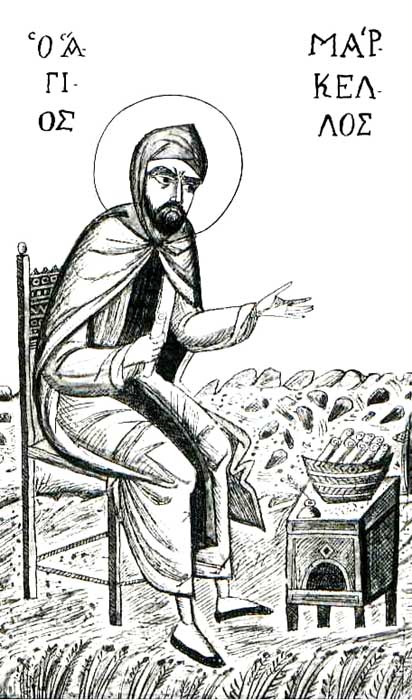 He was born into a wealthy family who lived in Apamea, Syria (located near the city of Hama and containing important antiquities). He was orphaned at a young age and moved to Antioch to study worldly sciences. He realized the futility of what he had set out for. He distributed his possessions to the poor and traveled to Ephesus. There he began to earn his living by working as a calligrapher. After work, he would go to night prayers in the monasteries and churches whose doors opened to him of their own accord.
He was born into a wealthy family who lived in Apamea, Syria (located near the city of Hama and containing important antiquities). He was orphaned at a young age and moved to Antioch to study worldly sciences. He realized the futility of what he had set out for. He distributed his possessions to the poor and traveled to Ephesus. There he began to earn his living by working as a calligrapher. After work, he would go to night prayers in the monasteries and churches whose doors opened to him of their own accord.
He left his place after he renounced the world and lived in a monastery on the banks of the Euphrates River. Then he moved to Constantinople and joined a monk in a monastery near the Church of Saint Menas. The head of this monastery distributed his three hundred monks into six choirs that took turns praying in the church twenty-four hours a day. That is why this monastery was called the one that never sleeps. The head of this method and its inventor was Saint Alexander.
Markellos acquired many virtues until he became the most radiant monk in the monastery. This aroused the envy and jealousy of a number of the monks in the monastery. When the time of the abbot came and another took over, he made the saint, in revenge, a caretaker of the monastery's mill donkey. However, the virtue of Saint Markellos was apparent to everyone and to the abbot, who soon entrusted him with the spiritual care of the brothers. The abbot soon passed away, so the brothers chose Markellos (against his will) as their new abbot. During his reign, the fame of the monastery of those who never sleep spread everywhere, and students of monastic life began to come to it even from the West, Persia, and Armenia. One day a man named Phartrius came to it, so he and all his sons became monks and donated his vast wealth to the monastery.
The monastery became one of the most prominent spiritual and cultural centers. It contained a rich library and had a large number of monks, some of whom were interested in copying and decorating icons. God blessed Marcellus with the talent of performing miracles and healing the sick. He became a refuge for the poor and needy and loved to distribute. In return, God increased the monastery’s wealth many times over. When one of the saint’s brothers died, his great wealth passed to him. He did not keep anything for his monastery, but distributed it all to the poor and needy monasteries. It is said that a famine struck the monastery area. Some poor people went to him and asked for help from Saint Marcellus. He summoned the treasurer and asked him to give them everything he had. There were ten silver coins in the box. He did so, but he kept one coin for emergencies. Suddenly, a rich man visited the monastery and gave the abbot ninety talents of gold. The saint knew in his spirit what had happened. Then he called the treasurer and said to him: The Lord God willed that we should have a hundred talents through this pious man, but because you did not obey what I commanded you and kept a piece of silver, the Lord has withheld from us ten talents of gold.
Marcellus was also a refuge for the oppressed and weak in the face of the emperors who considered him their teacher and sought his opinion and advice. He cared for souls burdened with the weight of sin. He was all to all according to the measure of the overflowing love of the Lord in his heart. He remained thus until he fell asleep in the Lord after sixty years of monastic ascetic life.
The Orthodox Church commemorates him on December 29, the day of his repose.
Troparia in the eighth tune
Through you, O righteous Markulus, the image was carefully preserved, because you carried the cross and followed Christ, and you worked and taught to overlook the body because it passes away, and to care for the matters of the immortal soul. Therefore, O righteous one, your spirit rejoices with the angels.


